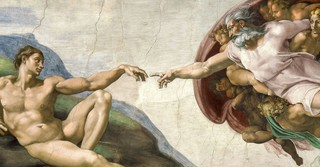4 Verses to Help Us Understand the Mystery of the Trinity
Share

Official statements that unify believers across traditions and denominations affirm the biblical truth of the Trinity. For instance, in the Athanasian Creed there is the emphasis on the Father, Son, and Holy Spirit being equally God. Such ancient statements help the church guard against heresies, like the denial of the divinity of Jesus. We, too, can use these definitions and statements to recognize that groups like the Jehovah’s Witnesses and Latter-Day Saints do not align with biblical orthodoxy.
However, these creeds are not our main source about the Trinity. They are statements that express what the Bible teaches. For in discussing the theological doctrine of the Trinity, we are discussing a fundamental fact about the Lord God. He is the true God of Scripture who is the Father, Son, and Holy Spirit – one God, three persons. Not three gods, or one god expressing himself in different ways. But three unique persons who are the one true God.
Fully understanding this truth is difficult, even for individuals who have been believers for many years. Yet, there are a few key verses that can help us in our study of the Trinity. These selections show us who the Lord God is and how He has revealed Himself to us. Such a study goes beyond intellectual knowledge since we are learning about the living Lord who desires an eternal relationship with us. Our beliefs about Him matter.
Photo credit: ©Getty Images/jakkaje808

1. Genesis 1:1-2
“In the beginning God created the heavens and the earth. Now the earth was formless and empty, darkness was over the surface of the deep, and the Spirit of God was hovering over the waters.”
Long before anyone expressed thoughts about the Lord, God existed. Before animals and humans roamed the land, God existed. Before the world came into being, God existed. Genesis 1:1 tells us that “in the beginning God.” He has always been and will always exist. He is the eternal God.
He is not a created being, having been formed by an endless line of created beings. Neither did He create a lesser being to use to form the world. He is the Creator who made all things – from the highest heavens to the planet we call home.
But even from the first chapter of Genesis, we find evidence of the Trinity. The Lord referred to Himself with plural language. On day six, when He created humans, He said, “Let us make mankind in our image” (Genesis 1:26). Some scholars and commentators argue that this is not a reference to the Trinity since such an interpretation would be reading New Testament doctrine back into the Old Testament. The traditional view, though, held by church fathers and early theologians, was that this verse is an indication of the Trinity, as the Keil and Delitzsch Biblical Commentary on the Old Testament notes. However, even without this plural statement, there is proof of the Trinity earlier in the passage. In verse two, the Bible references the Spirit of God hovering over the waters. The Holy Spirit – the third member of the Trinity – was involved in creation, lovingly guiding and directing the formation of the world.
We read about this forming over the next six days of creation as He brings day and night into existence, makes the seas and lands with all the animals and plants, sets the stars and moon in place, and crafts humankind from the dust of the ground. Our Creator is not only powerful as the Maker of all, He is a Master Artist who delighted in His work. In love and goodness, He created our world, which is why everything in existence bears His mark. God did not bring us into existence because of boredom, and then carelessly toss us aside. He lovingly created us for His pleasure and glory.
Other parts of Scripture affirm all the members of the Godhead’s power and loving work in creation. The New Testament describes how Jesus, the Son, made all things. As Colossians 1:16-17 says, “For in him all things were created: things in heaven and on earth, visible and invisible, whether thrones or powers or rulers or authorities; all things have been created through him and for him. He is before all things, and in him all things hold together.” What He created, He continues to sustain through His loving strength.
The Father, Son, and Holy Spirit is the eternal, uncreated God who formed all things by His majesty and creativity. When we look at the world around us, and in the mirror, we see the evidence of His handiwork.
Photo credit: ©Getty Images/Vieriu Adrian

2. Matthew 28:19
“Therefore go and make disciples of all nations, baptizing them in the name of the Father and of the Son and of the Holy Spirit/”
Before Jesus ascended to the Father, He gave the disciples a final command. He told them that all authority in heaven and on earth had been given to Him, and so He was commanding them to make disciples of every nation (Matthew 28:18-20). As part of this disciple-making process, they would baptize individuals from all people groups into the name of God, teaching them to observe all that Jesus had commanded. And demonstrating again His deity, He told them that no matter where they went, He would always be with them (Matthew 28:20). Like the Father and Holy Spirit, Jesus is omnipresent in His divinity.
As we can see from this verse, Jesus’ command has a trinitarian emphasis. He told them to baptize in the “name of the Father and of the Son and of the Holy Spirit.” This is not necessarily a specific formula for baptism but rather emphasizes being baptized into the name of the Lord. Notice that Jesus did not use the plural form, but the singular “name,” stressing the unity within the Trinity (also see John 10:30). The living God of the Bible is truly one (Deuteronomy 6:4). For Christianity is monotheistic, not tritheistic or polytheistic. Scripture teaches that the Lord is one God who is three persons – the Father, Son, and Holy Spirit.
We should be careful though not to assume that this means all the members of the Trinity are the same person. Christ did not say that the Father is the Son and Holy Spirit. Authority had been given to Him by the Father showing that Jesus is not the same person as the Father, and neither is He the Holy Spirit (Matthew 28:18). These details may seem unimportant. Yet, they help us distinguish between a biblical view of God and heretical teachings.
Being a disciple is about knowing the Godhead and having a relationship with Him. We are baptized into His name – the One who is at work bringing people to the knowledge of salvation and growing them to become fruitful disciples. Therefore, the Christian’s task to spread the gospel and make disciples is not something we do on our own. Our Lord – the Father, Son, and Holy Spirit – is with us as we go into the world to declare the good news.
Photo credit: ©Getty Images/Ivan Pantic

3. John 1:1-3
“In the beginning was the Word, and the Word was with God, and the Word was God. He was in the beginning with God. All things were made through him, and without him was not any thing made that was made.”
Like Genesis 1:1, the opening statement of John’s Gospel starts with eternity past. Before the creation of anything, the Word or Logos forever existed and was with God in the beginning, living in perfect communion. The next part of the verse is stunning: “the Word was God.” This eternal Word was not only with God, but He is God.
He is the almighty Creator that we read about in Genesis, who is the source of all life. But He is not some lesser being, a demiurge or ranking angel through which God crafted the world. Jesus is God – of the same essence and substance as the Father, though unique in personhood.
Later in the first chapter, we read about the Word becoming flesh and making His dwelling among us (John 1:14). The Word or Logos is Jesus Christ, the unique Son of God who was sent by the Father. As John the Apostle explained, “No one has ever seen God, but the one and only Son, who is himself God and is in closest relationship with the Father, has made him known” (John 1:18). Jesus perfectly reveals the Father since they are both equally God (Hebrews 1:1-4). Hence, Jesus could rightly say that whoever had seen Him had seen the Father (John 14:9).
And this great God who made all things is a compassionate Lord. The Father gave us His Son to die for our sins so we could receive eternal life (John 3:16). Despite being the powerful Creator, the divine Word humbled Himself by taking on flesh to identify with us. He understands humanity’s struggles, sorrows, and pains.
The first chapter of John, then, shows us the majesty of Jesus, the pre-existent Son of God who is the source of all things. We also gain a deeper understanding of God’s love for us and willingness to make us His children (John 1:12-13). His love is demonstrated through the coming of His Son to tabernacle among us and die for us.
Photo credit: ©Getty Images/Liliboas

4. John 14:23
“Jesus answered and said to him, ‘If anyone loves Me, he will keep My word; and My Father will love him, and We will come to him and make Our home with him.’”
On the night of His betrayal and arrest, Jesus encouraged the disciples. He told them that those who loved Him would obey His commands. They would follow His teachings, including loving one another as Christ had loved them (John 13:34-35). And true disciples – those who obeyed the Lord – have the promise of God’s indwelling presence.
Jesus specifically mentions that He and the Father will live within the disciples and abide with them. However, earlier in the passage, Christ also mentioned the Holy Spirit who would come after Jesus’ ascension. This Advocate, Counselor, or Comforter would be with the disciples forever to teach and remind them of all truth (John 14:16, 26). He would indwell the disciples and take up residence within them (John 14:17; see also Acts 2:1-4).
The disciples had just received the wonderful promise that Jesus was going to prepare a place for them in heaven, and one day return to take them to live with Him (John 14:2-3). Being with the Lord in heaven is the longing of all believers. But believers also have the promise that the Lord is with us now, abiding with us. The Greek word for “home” or “abode” is used only here and in verse 2, showing their connection. God the Father, Son, and Spirit has made His home within each disciple.
As we follow and obey Him in love, we will experience His abiding presence because He dwells with us. This blessed promise foreshadows the future day when our Lord will live physically with us on a restored earth for all eternity (Revelation 21:3). But that does not mean we must wait to walk with our God. Eternal life starts now as we lean into our relationship with the Father, Son, and Holy Spirit (John 17:3). With Him, we are home.
Learning about the Trinity involves more than gathering facts. We are not seeking to compile abstract statements that have no bearing on everyday life. Rather, we are studying the living Lord whom we can know and commune with. This great God, who forever exists as three persons, is our inheritance, hope, and deepest longing.
May every verse we read about the Trinity lead us deeper in love and awe of Him.
Photo credit: ©Getty Images/Marjan Apostolovic
